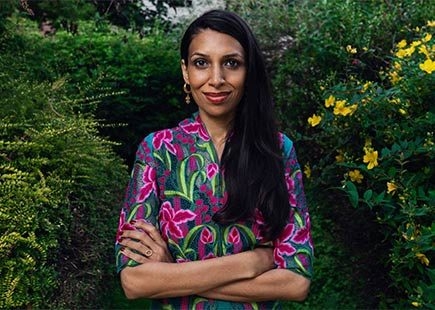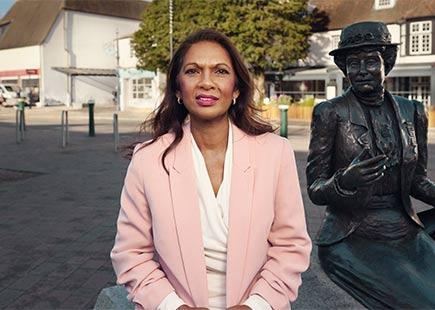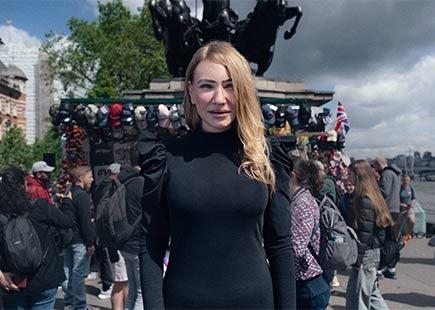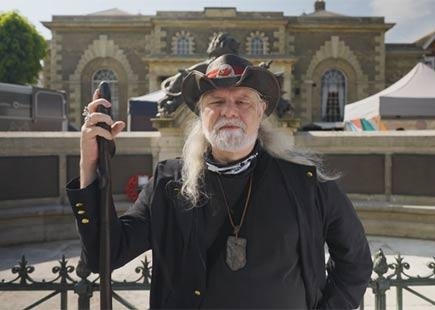More than half of first time voters don’t feel there is a political party that represents them

Celebrated portrait photographer Tom Oldham has launched his latest project, ‘The Hopefuls,’ aimed at addressing the widespread political disillusionment among first-time voters in the UK.
Supported by extensive research on first-time voters, Oldham’s campaign shines a light on a critical issue: more than half of first-time voters (56%) do not believe there is a political party that truly represents them and less than a fifth (18%) know who their local MP is.
This sentiment is echoed across various demographics, underscoring a pervasive sense of disenfranchisement. Only 28% of first-time voters feel that there is a party that aligns with their views, highlighting a significant gap in political engagement and representation.
This powerful self-funded project aims to capture portraits of candidates from across the whole political spectrum, including Faiza Shaheen (Independent), Gina Miller (True & Fair Party), Lois Perry (UKIP), and Arthur Pendragon (Independent) standing in their potential future constituencies.
In addition, Oldham asked every candidate a series of identical questions, to get under the skin of who they are. With this initiative, Oldham hopes to combat voter apathy and restore faith in the democratic process by humanising the often faceless and distrusted political landscape, encouraging first time voters to register and get out to vote.




Survey Insights: The Root of Disillusionment
A
staggering 42% of respondents do not trust any political party, citing
broken promises and an inability to deliver on key issues as primary
reasons for their disillusionment. Comments from the survey paint a
vivid picture of this distrust: “None of them know what it's truly like
to live on the breadline,” and “they never treat the country correctly
but they always treat their bank accounts well,” reflecting a profound
sense of betrayal and scepticism.
Interestingly,
this move away has been reflected in the number of independent
candidates that have chosen to stand at this election (460 in 2024 vs.
224 in 2019) - with both voters and those choosing to stand looking
outside the traditional parties.
But
even independents will have to tackle distrust, as it extends to
political candidates as well. 38% of voters say they do not engage with
candidates, because of a lack of trust in the political process
entirely, particularly among those aged 55 and older (43%). The survey
also reveals that 37% of first-time voters do not even know who their
local candidates are, further complicating their ability to engage
meaningfully with the political process.
Knowing
the debates and media airtime are focused on traditional parties, Oldham
ensured he was showcasing the breadth of some of these independents
standing through this project and photographed candidates including
David Buckley, a regular Conservative voter standing in Windsor, Andrew
Feinstein, a former MP in Mandela’s government in South Africa, standing
against Keir Starmer in Holborn and St Pancras.
Many of these candidates echoed sentiments by first time voters, Chan Abraham, an Independent standing said; 'I believe this nation is badly broken. It's been broken by those who are charged with governance, and I'm convinced that the only people who can restore what has been lost will be people who are independent. People like myself, who cannot be bribed, bought, bullied, or blackmailed.'
Helen
Clawson, an Independent standing in Mid Cheshire echoed the lack of
understanding many feel for traditional candidates, saying: I have lived
many of the experiences that a lot of people are facing today. I grew
up in poverty on a council estate with a very abusive parent. So
something in me doesn't like to see people suffer. I've got genuine
empathy.
Faiza Sheehan, now running as an Independent in Chingford and Woodford Green, summarised; “People
will tell me on the doorstep that they feel like they don't have any
choice. They feel that they are voting for the best of a bad bunch, that
politics doesn't make any difference to their lives or politicians are
out for themselves.”
Barriers to Engagement
A
significant barrier to political engagement is the lack of knowledge
about political candidates and their platforms. Despite high levels of
social media usage, there is a notable lack of trust in the information
found there. Less than half (41%) of respondents trust what they read or
see on social media about political candidates. Trust levels are higher
among younger voters (51%) but significantly lower among women (39%).
Traditional
news sources and social media play nearly equal roles in informing
first-time voters, with 49% relying on news and 48% on social media.
Among 18-24 year-olds, social media is the primary source of information
(60%), reflecting a shift in how political information is consumed.
However,
the prevalent distrust of both politicians and the information channels
underscores the complexity of engaging this demographic effectively.
Policy Priorities and Representation Challenges
The
survey also highlights the top issues for first-time voters: the
economy (55%), education (41.9%), and social justice (41%). The
environment, while slightly less prioritised, remains significant with
32% considering it a top issue. However, many first-time voters struggle
to find a party that represents these issues effectively. Between
40-50% of respondents find it difficult to identify a party that aligns
with their policy priorities, underscoring a disconnect between voter
concerns and party platforms.
This
disconnect is particularly pronounced among older respondents, who,
despite feeling knowledgeable about politics, are less likely to feel
represented by any party.
The Impact of Tom Oldham's 'The Hopefuls'
Tom Oldham's 'The Hopefuls' aims to address these issues by putting a human face to politics, encouraging first-time voters to engage with their local candidates and understand the individuals behind the political rhetoric. By showcasing the diverse faces of British politics, Oldham hopes to challenge the stereotypes and foster a deeper connection between voters and the political landscape. He believes in this mission to the extent that he funded the project himself.
His portraits serve not only as a visual celebration of democracy but also as a call to action for those who feel disenfranchised or disillusioned. Oldham's compelling storytelling ability promises to challenge perceptions and inspire a new generation of voters to participate actively in the democratic process. Every image can be found alongside a transcript of their interview responses and for many, a video on a custom website, that shuffles candidates so that visitors can get introduced to a new face, and learn why they’re standing, each time.
"It’s
clear to see that trust in politics and politicians is at an all time
low which is making many disengage entirely," Oldham explains. "Part of
the issue is that first time voters don’t think that any of the parties
represent them and a lot of that seems to be because they don’t know who
their representatives are. I hope this series can showcase the many
faces of British politics and encourage first time voters to register to
vote and get to the polls."
If you enjoyed this article, you can subscribe for free to our weekly email alert and receive a regular curation of the best creative campaigns by creatives themselves.
Published on:





